| Srl | Item |
| 1 |
ID:
150623
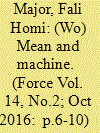

|
|
|
| 2 |
ID:
067811
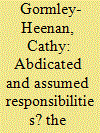

|
|
|
| 3 |
ID:
161686


|
|
|
|
|
| Summary/Abstract |
This article assesses the character, role and outcomes of the Airports Commission. Analysing its workings from September 2012, it evaluates the final recommendations and then charts their subsequent public reception. The article claims that the Airports Commission's endeavours to depoliticise aviation by using ‘reasonable’ methods and impartial judgements—often embodied in Howard Davies himself—have been met with local resistance and political opposition, focussed on the proposal to expand either Heathrow or Gatwick. It exposes how the recourse to expert commissions offers only temporary respite for government responsibility and accountability in the making of hard decisions. It concludes that the inability to secure a binding and acceptable agreement does not just reside at the door of the Airports Commission, but rests also on the failures of political leadership and the ‘missed opportunity’ to articulate a sustainable vision for aviation after the 2010 moratorium on airport expansion in the south‐east of England.
|
|
|
|
|
|
|
|
|
|
|
|
|
|
|
|
| 4 |
ID:
124768
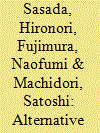

|
|
|
|
|
| Publication |
2013.
|
| Summary/Abstract |
Although party polarization is one of the most significant focal points in the study of contemporary US politics, a limited number of studies have examined its theoretical implications for other countries. In addition, a great deal of effort has been made in the study of the changes in voting bases (i.e., constituencies or interest groups). However, little attention has been given to the features of party organization. In this study we look at the process of polarization between two major parties in Japan in recent years and analyze the way Japanese parties took an alternative path to polarization. We argue that party polarization can be caused by the strategic position-taking of the party executive in addition to the centralization of the party organization.
|
|
|
|
|
|
|
|
|
|
|
|
|
|
|
|
| 5 |
ID:
131480
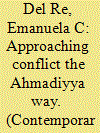

|
|
|
|
|
| Publication |
2014.
|
| Summary/Abstract |
The role and incidence of the Ahmadiya community in Israeli society, with its around 2,000 members, is not related to the dimension of the community, its religious activities or its dissemination on the territory. It is related to the strong social and political engagement of the community not only in religious but also in civil society activities where it resides, despite all the difficulties that derive from its disputed role in Islam. The Ahmadiyya community in Haifa constitutes a relevant example of contribution to peaceful and productive coexistence. Haifa itself is characterized by a very interesting social and political climate, by which it is considered a "model" of coexistence in Israel, despite the fact that many contrasts and contradictions persist, such as forms of discrimination and inequalities. The civil society is particularly active, and institutions and NGOs devoted to the Arab-Jewish dialogue are many. Religious and political leaders communicate and participate together in various events, where their openness and mutual respect are intended to symbolize harmony with the intent of this being mirrored by the whole society. The Ahmadiyya Community plays an active role in this evolving process. The author, who has carried out qualitative research in Haifa to film a scientific documentary on the Holiday of Holidays and the validity of the Haifa model of coexistence, applied participant observation in the framework of grounded theory to analyze the role and impact of the Ahmadiyya community in the complex Israeli context, also on the basis of extensive in depth interviews with community members and leaders
|
|
|
|
|
|
|
|
|
|
|
|
|
|
|
|
| 6 |
ID:
160488
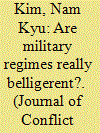

|
|
|
|
|
| Summary/Abstract |
Does military rule make a state more belligerent internationally? Several studies have recently established that military autocracies are more likely than civilian autocracies to deploy and use military force in pursuit of foreign policy objectives. I argue that military regimes are more likely to resort to military force because they are located in more hostile security environments, and not because they are inherently aggressive. First, I show that rule by military institution is more likely to emerge and exist in states facing external territorial threats. Second, by examining the relationship between military autocracies and conflict initiation, I find that once I control for states’ territorial threats, the statistical association between military regimes and conflict initiation disappears. Additionally, more evidence suggests that civilian dictatorships are more conflict-prone than their military counterparts when I account for unobserved dyad heterogeneity. The results are consistent across different measures of international conflict and authoritarian regimes.
|
|
|
|
|
|
|
|
|
|
|
|
|
|
|
|
| 7 |
ID:
027689
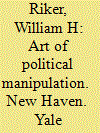

|
|
|
|
|
| Publication |
New Haven, Yale University, 1986.
|
| Description |
xii, 152p.
|
| Standard Number |
0300035918
|
|
|
|
|
|
|
|
|
|
|
|
Copies: C:1/I:0,R:0,Q:0
Circulation
| Accession# | Call# | Current Location | Status | Policy | Location |
| 029331 | 303.34/RIK 029331 | Main | On Shelf | General | |
|
|
|
|
| 8 |
ID:
139628
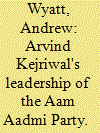

|
|
|
|
|
| Summary/Abstract |
The Aam Aadmi Party (AAP) made its national debut in 2014. Arvind Kejriwal, the National Convenor and a founding leader of the AAP, had a decisive impact on the character of the party. This paper reflects on the significance of Kejriwal's leadership in relation to the literature on party systems and political leadership. In 2014, he attempted to open up a new political cleavage and add a new party to the national party system. His entrepreneurial activity drew attention to the issues of corruption and governance. Kejriwal's political leadership is assessed in terms of his ability to set objectives for the party, his interaction with followers, his efforts to represent those followers and the development of party institutions. Kejriwal's performance as a party leader in 2014 was uneven. The outcome of the Lok Sabha elections exposed the geographical limits of Kejriwal's appeal even as he attempted to provide national leadership.
|
|
|
|
|
|
|
|
|
|
|
|
|
|
|
|
| 9 |
ID:
161172
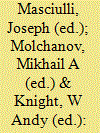

|
|
|
|
|
| Publication |
Surrey, Ashgate Publishing Limited, 2009.
|
| Description |
xviii, 568p.: tableshbk
|
| Series |
Ashgate Research Companion
|
| Standard Number |
9780754671824
|
|
|
|
|
|
|
|
|
|
|
|
Copies: C:1/I:0,R:0,Q:0
Circulation
| Accession# | Call# | Current Location | Status | Policy | Location |
| 059503 | 303.34/MAS 059503 | Main | On Shelf | General | |
|
|
|
|
| 10 |
ID:
121678


|
|
|
|
|
| Publication |
2012.
|
| Summary/Abstract |
The provision of national security is one of the essential responsibilities of government. As
the Japanese advance neared Australia in early 1942 it became clear that Australia's interwar
political leadership had failed to provide adequately for the nation's security. This article
explains how in 1942 Australia found itself virtually bereft of military power as well as the
steps to remedy the crisis. In doing so, the article questions whether the recent budgetary
decisions by today's political leadership will also result in an Army with a similar degree
of unreadiness, and one that is incapable of meeting the challenges of today national
security environment.
|
|
|
|
|
|
|
|
|
|
|
|
|
|
|
|
| 11 |
ID:
133800
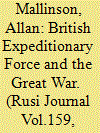

|
|
|
|
|
| Publication |
2014.
|
| Summary/Abstract |
A counterfactual account of what Britain's leaders could have done prior to the Great War to prepare the country more effectively for fighting a European land war
The decision-making of Britain's political and military leaders in August 1914 has been subject to much scrutiny in the intervening century. Allan Mallinson argues vehemently that the wrong decisions were taken in the years preceding the outbreak of the conflict, and presents a counterfactual of what Britain's experience could have been had conscription been introduced or sounder preparations for a land engagement been made before 1914.
|
|
|
|
|
|
|
|
|
|
|
|
|
|
|
|
| 12 |
ID:
119310
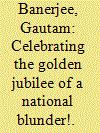

|
|
|
| 13 |
ID:
142128
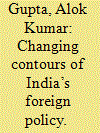

|
|
|
|
|
| Summary/Abstract |
Undoubtedly, Modi’s international engagements were a continuation of India’s foreign policy under the preceding UPA government led by Congress. But he injected a new energy into the relationships with neighbours like Bhutan and Nepal, and major powers like China and the US. The present political leadership has made clear to the immediate neighbourhood that India is ready to share its prosperity because the policy makers understand peace could be established only through prosperity and would enhance constructive engagement and a more integrated and inter-connected sub-continent. Modi rather than making India a marginal receiver of the dispensation of the international system has lifted India’s status as one of the dispensation of the international system.
|
|
|
|
|
|
|
|
|
|
|
|
|
|
|
|
| 14 |
ID:
127754
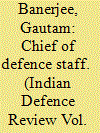

|
|
|
| 15 |
ID:
130193


|
|
|
|
|
| Publication |
2014.
|
| Summary/Abstract |
In 2013, China's new party and state leadership specified its domestic and foreign policies in the context of Xi Jinping's vision of the ''Chinese Dream.'' A new reform package modifying China's growth and development model has been announced. In foreign policy, a debate has commenced regarding another side of the ''Chinese Dream'': China's rise as a ''Great Power.''
|
|
|
|
|
|
|
|
|
|
|
|
|
|
|
|
| 16 |
ID:
114839
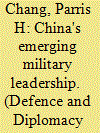

|
|
|
| 17 |
ID:
187203
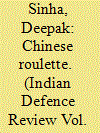

|
|
|
| 18 |
ID:
126737
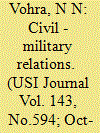

|
|
|
| 19 |
ID:
126118
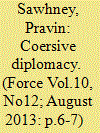

|
|
|
|
|
| Publication |
2013.
|
| Summary/Abstract |
In an unexpected development, a Chinese border guards' platoon (30 soldiers) moved in and pitched tents 19 kilometres inside Indian territory at Depsang Valley overlooking Daulet Beg Oldie (DBO) on 15 April 2013 in Ladakh in the Western sector. The last time they did a similar thing was in 1986 in Sumdorong Chu in the Eastern sector (Arunachal Pradesh). Both times, the Chinese forces had blessings from the highest quarters: then supremo Deng Xiaoping and now the President and chairman of the Central Military Commission, Xi Jinping. Then, the Chinese were not a risen power and the occupation of Sumdorong Chu, of little tactical significance, was meant to test Indian gumption, through military coercion, after the passing away of Prime Minister Indira Gandhi, who Deng admired for being a strong and determined leader. There was a year-long stand-off with menacing military build-up on both sides ending in a mutually agreed disengagement with neither side looking a loser. The Chinese finally left Sumdorong Chu of own free accord in 1995. China's military coercion had not worked for two reasons: India showed political will, and China's military capability did not match its coercion.
|
|
|
|
|
|
|
|
|
|
|
|
|
|
|
|
| 20 |
ID:
133970
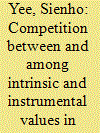

|
|
|
|
|
| Publication |
2014.
|
| Summary/Abstract |
Recently there has been a great deal of talk about visions and alternative visions of the world and the values involved in each vision.1 Obviously it is important for us to see clearly the various visions of the world. But the picture is quite murky and there is really no end to history, and there will be no conquering of one vision over another anytime soon. In the meantime, it is more important for us to be good decision-makers in any vision of the world that we find ourselves in, or choose to live in. To illustrate, if we are capitalists, we'd better be good capitalist decision-makers; if we are socialists, we'd better be good socialist decision-makers.
|
|
|
|
|
|
|
|
|
|
|
|
|
|
|
|